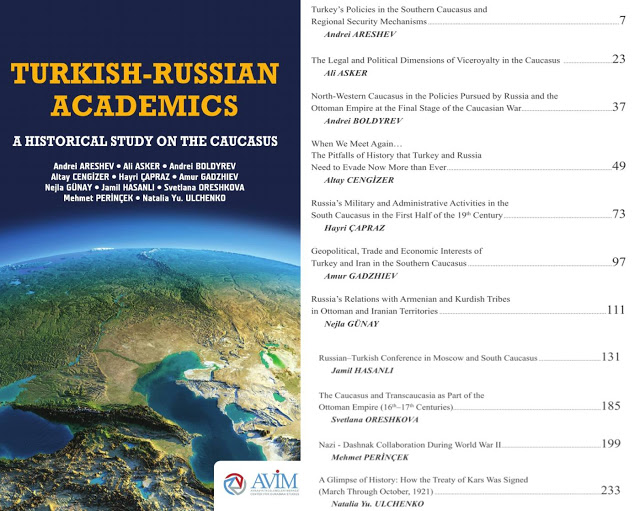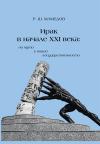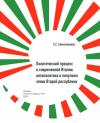Turkish – Russian academics. A historical study on the Caucasus
| Тема: | Многополярный мир |
| Год издания: | 2016 |
Описание
Отв. ред.: Andrew Areshev, Ali Asker, Andrew Boldyrev, Altay cengizer, Hayri Capraz, Amur Gadzhiev, Nejla Gunay, Jamil Hasanli, Svetlana, Oreshkova, Mehmet perincek, Natalia Yu. Ulchenko
Издательство: AVIM
ISBN: 978-605-60619-6-7
Turkey and Russia, having proximity and shared destiny with each other due to being historical neighbors, have had many ups and downs throughout historical ranging from hostilities and war to friendship, support and cooperation.
With globalization setting in and after the collapse of the Soviet Union, Turkish-Russian relations grew to become multi-faceted and multi-dimensional, providing a rich ground for scientific academic studies and research.
History no doubt is still a prominent field. Joint publications, symposiums and conferences on history carried put in the recent period have been concrete indicators of the developing cooperation between Turkey and Russia. Maintaining and developing this cooperation is of vital importance for the future.
As a result of contacts and meetings with the esteemed head and academicians of the Turkish Studies Programme of the Russian Academy of Sciences, Institute of Oriental Studies, the idea has emerged to compile a book on the work of some distinguished Turkish and Russian historians and academics, particularly on the history of the Caucasus region. In accordance with tis understanding, the Center for Eurasian Studies (AVIM) is pleased to edit this historical academic study in a book.
We are grateful to all the participants for their valuable contributions, all outcome of meticulous academic work.
We also trust this initiative will help to encourage Turkish and Russian historians and academics to pursue more extensive and comprehensive studies and inspire them to accelerate their work.
Прошедший опрос
-
Какие угрозы для окружающей среды, на ваш взгляд, являются наиболее важными для России сегодня? Отметьте не более трех пунктов
Увеличение количества мусора 228 (66.67%) Вырубка лесов 214 (62.57%) Загрязнение воды 186 (54.39%) Загрязнение воздуха 153 (44.74%) Проблема захоронения ядерных отходов 106 (30.99%) Истощение полезных ископаемых 90 (26.32%) Глобальное потепление 83 (24.27%) Сокращение биоразнообразия 77 (22.51%) Звуковое загрязнение 25 (7.31%)

«Международные исследования в России»

Статистические данные по международной проблематике

Электронные журналы и библиотеки



